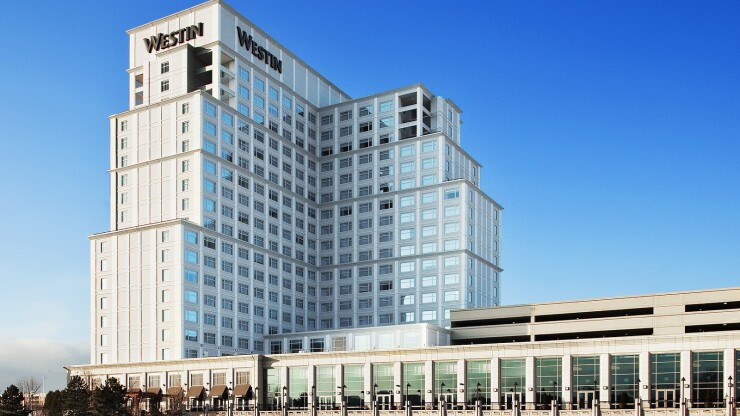A suburban Chicago hotel and conference center that restructured its debt through Chapter 11 two years is facing new obstacles from the COVID-19 pandemic.
The Westin Lombard Yorktown Center closed to the public in March in response to stay-at-home orders that canceled events and shuttered restaurant dining and remains shut down.

The Lombard Public Facilities Corp. sold $142 million of tax-exempt bonds in 2018 through the Wisconsin-based Public Finance Authority in exchange for the original $190 million 2005 issue. The deal imposed cuts on bondholder principal and pushed out repayment to a 50-year term.
The exchanges were aimed at buying the project some time for its revenues to cover rising debt service demands after the 2008 recession cut deeply into revenue projections. The pandemic now threatens further setbacks.
The corporation drew about $512,000 from reserves to subsidize operations for the facility, according to an
A cushion remains as $5.5 million was held in the senior capital reserve that was tapped and the project held $8.2 million in fund balances, according to financial statements as of Dec. 31.
“As previously advised, the restaurant and banquet space and the hotel have closed to the public as a result of the COVID-19 pandemic and corresponding regulatory responses,” the April 30 notice reads.
The hotel managers decided to temporarily close to the public March 29 “in light of declining business levels due to COVID-19,” according to an earlier notice that referenced Gov. J.B. Pritzker’s mandate that shuttered restaurants and bars and banned large gatherings.
The hotel manager in April submitted a request with the trustee to cover a $512,000 projected shortfall in hotel operating expenses through May 31. The indenture on the 2018 restructuring bonds permits hotel operating expenses to be covered by revenue held in the senior hotel capital expenditure reserve fund with the consent of various parties.
The trustee obtained the required consent and the transfer was made April 28. “The trustee will continue to work with the borrower with respect to the hotel, restaurant and banquet space,” the notice reads.
A lawyer for the facilities corporation did not respond to a request for comment on the project’s status, how the next debt service payment due in July would be covered, or if a bondholder forbearance would be sought.
The project made a slight $44,000 draw to cover the $500,000 July 2019 payment on four of the six series of bonds that make up the restructured bonds.
Project revenues appeared to cover the January 2020 payment as no notice of reserve use was posted. A required quarterly update published this year from consultant Eisner Amper LLP concluded that as of January 30 “no event of default under the Indenture (or event that with the giving of notice or passage of time would constitute such an event of default) has occurred and is continuing.”
Lombard established the corporation to issue the original 2005 bonds and manage plans for the Westin with village support through a tax rebate agreement and its appropriation pledge. The village, which once carried the AA rating of S&P Global Ratings, lost its investment grade rating after reneging on the pledge.
After years of failed negotiations, the village and corporation struck a deal with key bondholders and the insurer on a portion of the bonds and sought the bankruptcy’s court’s blessing in the Chapter 11 case filed in July 2017. The goal was to establish a capital structure they believed project revenues could support. The village’s appropriation pledge is no longer attached.
Bondholders saw recovery rates between 77% and 86% on three most senior series while a subordinated $29 million series took a near total loss.
As part of the reorganization, the village board approved a restructuring agreement that provided $3 million for facility improvements and up to a total of $3.7 million in tax-increment financing support in the coming years for site infrastructure improvements.
Though the village also continues to contribute revenue from a special 1% so-called Places for Eating Tax enacted last year through 2021 and a tax rebate of about $1 million remains in place, it’s no longer obligated to repay the bonds. The restructuring contains various legal releases for the village, significantly reducing its legal liability.
The reorganization received overwhelming to unanimous approval in a balloting process. Major bondholders included Nuveen Asset Management, Oppenheimer Rochester High Yield Municipal Fund, and ACA Financial Guaranty, insurer on a portion of the bonds and a holder and controlling party based on the original bond indenture.
The board that endorsed the hotel project believed demand existed, that it would spur economic development, and that it was worth the risk to the village. The facility has a 500-room hotel, two restaurants, 39,000 square feet of meeting and convention space, a 25-meter indoor swimming pool and fitness center, and a 675-car, four-story parking deck.





